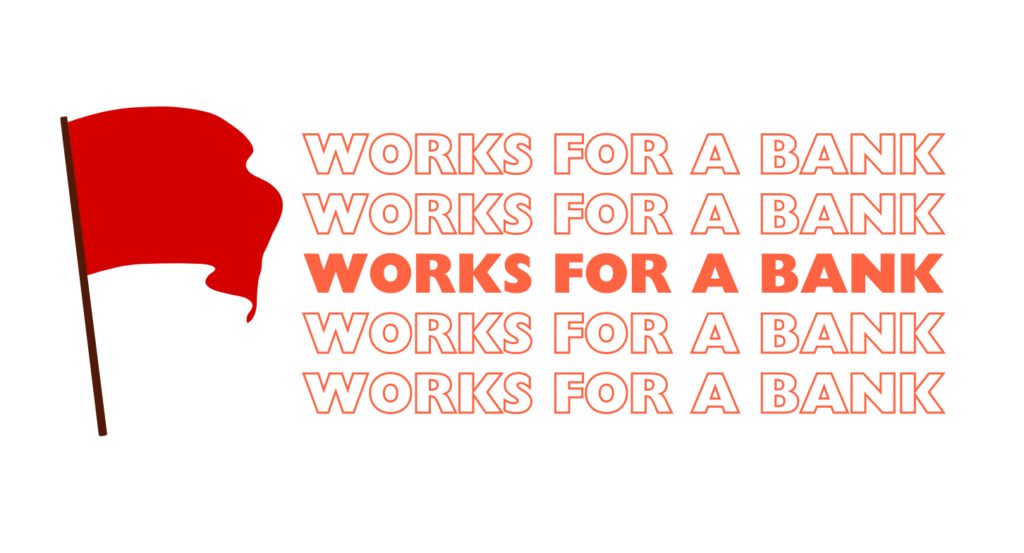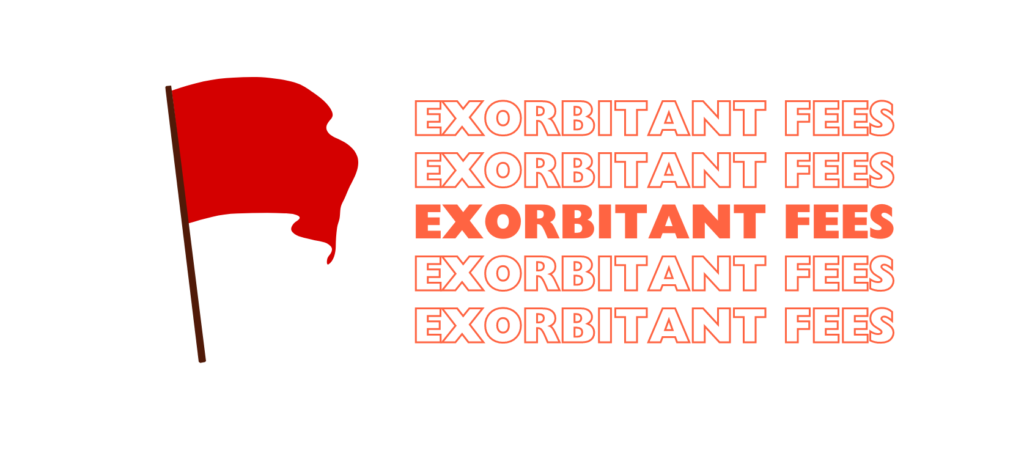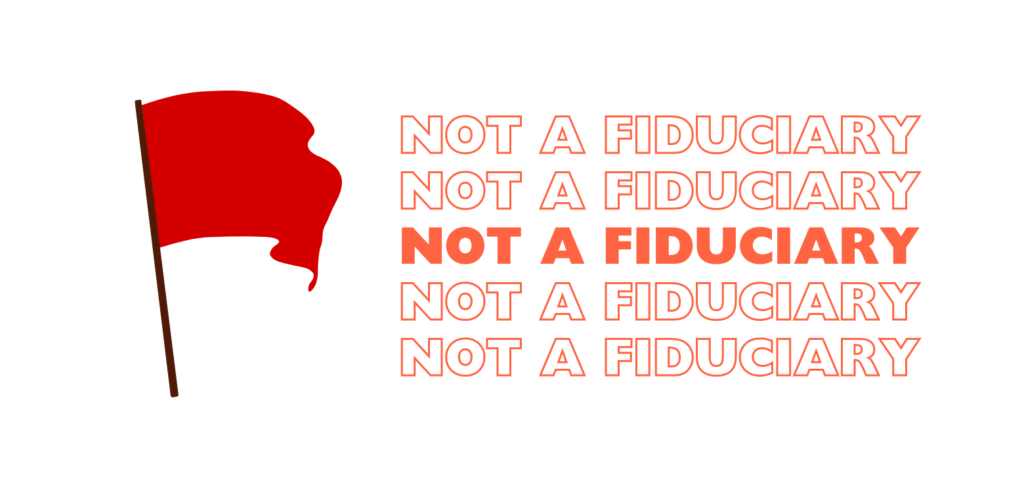In the post, we will review how to spot a terrible financial advisor from my own experience. But first, our disclosure:
Disclosure: This post may contain affiliate links, meaning we earn a commission on purchases made through those links at no extra cost to you. As an Amazon Associate, I earn from qualifying purchases.
Disclaimer: The content on this site is for informational and educational purposes only and does not constitute financial, investment, legal, tax, or any other professional advice and should not be used as a substitute for professional advice. For more details, read our full Disclaimer.
There are a lot of good professional financial advisors, but not all are created equal. Here is my experience meeting with a bad financial advisor and the warning signs to watch out for. It was a great learning experience for me, and I hope you learn a lot from my experience as well. Let the journey begin!
A Call From My Bank Begins My Journey
Before COVID, earning 1% in a high-yield savings account was like winning the lottery. For most people, the interest they were earning was closer to 0.1%. That was me at the 0.1% rate. Pathetic. I know! So, when my bank reached out to me with an enticing phone call, I couldn’t pass it up.
My bank, a large regional player, asked if I would like to come in and explore options for increasing the interest on my savings. These cold calls were not unusual and had become the norm over the years.
Every year or two, a different bank branch would call me, suggesting I move my money to a new account with a higher introductory interest rate. It was a win-win: The branch would get credit for opening a new account, and I would get a higher interest rate for a few months. Under this pretense, I agreed to meet.
However, what I thought would be a routine bank pitch turned out to be something I wasn’t expecting. Instead, it was a valuable life lesson on money, big banks, and the pitfalls of working with terrible financial advisors. I could have walked away as soon as I knew what was happening, but I couldn’t. I love this stuff and had to see where things would lead.
WARNING! Be careful when deciding on a financial advisor to work with, especially if you are a novice with money or have a hard time saying “No.” Many advisors are salespeople and insurance brokers masquerading as financial advisors.
What To Do Before Choosing A Financial Advisor
Whether you are searching for a financial advisor or not, I recommend becoming familiar with financial planning and investing. It doesn’t need to be complicated. The goal is to better understand your financial situation and goals before seeking professional advice. Doing so can help you select the best financial advisor for your needs.
If you are not sure where to start, I recommend three great fast reads: “The One-Page Financial Plan” by Carl Richards, “Millionaire Mission” by Brian Preston, and “The Little Book of Common Sense Investing” by John C. Bogle.
Financial Advisor Red Flag #1: Works For A Bank

The first sign I was about to deal with a terrible financial advisor happened the moment I arrived at the bank. Instead of meeting with the person I had spoken to on the phone, I was meeting with a financial advisor. It was a classic bait-and-switch. I was lured in with an offer to earn more on my savings, only to be peddled investment services.
I found myself in a situation where the financial advisor was peppering me with questions about my job, income, investments, and personal life. Without bowing to the pressure, I offered little information and turned back most questions.
I made it clear to the financial advisor that I would only share intimate details of my finances if I chose to work with him. I didn’t trust him and wasn’t about to reveal such private information to someone I had just met. You can blame it on where I grew up, but I find it hard to trust people.
Having lived most of my life in the Boston-New York City corridor, I am skeptical of strangers. If you’re from around here, you know what I mean. We’re always on guard around people we do not know. Nothing screams “Danger!” like a stranger trying to make small talk with you. When they do, all you think is, “What’s their angle?” while looking around to see if there are any accomplices circling you like sharks.
With my skepticism firmly in place, we agreed to meet again in a week. During that time, the financial advisor would develop an investment strategy for my cash. If I liked his proposal, then we could move forward with establishing a more intimate financial relationship.
The fun was just getting started, and his proposal was littered with red flags, starting with the fees.
Financial Advisor Red Flag #2: Exorbitant Fees

When I arrived for our follow-up meeting a week later, the financial advisor handed me a large printout. To my surprise, he recommended taking half of my cash and moving it into a low-cost, balanced 60/40 index fund.
A 60/40 portfolio consists of 60% stocks and 40% bonds. It is the most basic investment portfolio recommendation. I expected the financial advisor to recommend an expensive commission-based mutual fund with front-end or back-end load fees. So, as far as investment suggestions go, it wasn’t that bad, but then he guided me to the page with the fees.
I couldn’t believe the fee structure. The financial advisor charged well over 1% of assets under management, and the bank took its cut, too. The total fees approached 2% combined. Paying close to 2% for a financial advisor’s services is terrible. In fact, the maximum limit by law is 2% in most cases.
I remember wondering, “Why should I pay 2% in fees to invest in basic, low-cost index funds?” I could easily do that through my preferred low-cost brokerage, Fidelity, and avoid paying ridiculous fees.
There is nothing wrong with a financial advisor charging fees. However, it would be best if you were wary of financial advisors who charge exorbitant fees and affiliate with full-service banks and investment firms. They might charge excessive fees and push you toward expensive investments not in your best interest.
When seeking a financial advisor, you want one who will act in your best interest and be compensated based on their performance rather than through commissions on the products they sell. For this reason, money experts suggest that if you work with a financial advisor, you should choose one that is fee-based (flat fee, hourly, or percentage-based) and who acts as a fiduciary.
Financial Advisor Red Flag #3: Not a Fiduciary

As mentioned above, experts recommend choosing a fee-based fiduciary financial advisor if you work with a financial advisor. Why is it so important that the financial advisor be a fiduciary?
A fiduciary financial advisor is legally obligated to act in their client’s best interest. They must disclose potential conflicts of interest and prioritize their client’s financial well-being. If the financial advisor you are considering is not a fiduciary, and their legal contract with you does not mention their fiduciary duty, that’s a major warning sign.
I had two meetings with the bank-affiliated financial advisor, and at no point did he mention the fiduciary standard. His omission of the fiduciary standard over two hours of conversations was a warning sign of epic proportions. Not only was he charging fees near the maximum rate possible, but he was under no obligation to make financial decisions in my best interest.
I could tell the bank financial advisor was eager to close the deal, as I disclosed to him during our first meeting that I do not use a financial advisor. I sensed he thought I was a little naive about investing and prime for the picking. Little did he know I eat, sleep, and breathe personal finance. It’s my passion.
WARNING! The fiduciary standard does not guarantee protection against losses or unethical advisors.
Financial Advisor Red Flag #4: Pushes Whole Life Insurance

After hammering out the investment and fee details, the financial advisor switched gears and began touting the additional perks he could offer me. Then, he casually dropped a line about helping me save for college through whole-life insurance. That statement made me look for the exit of the building as if it were on fire.
Whole life insurance is expensive, and those who sell it can earn commissions of over 100% of the first year’s premiums. This hefty commission serves as a big incentive for salespeople. While insurance agents promoting whole life may emphasize its cash value, the guaranteed return can be lower than what you can get from a savings account.
So, when this financial advisor pitched such an expensive, commission-driven product to pay for college, he was only concerned with one person: himself. Some might benefit from this strategy, but I would not be one of them.
WARNING! Many people prefer term life insurance because it tends to be more affordable and provides coverage for a specific period, such as 10, 20, or 30 years. On the other hand, whole life insurance is more expensive. It provides coverage for your entire life and a cash value component that may not offer the best returns compared to other investment options. It’s important to carefully consider your financial situation and long-term goals when deciding which type of life insurance is right for you.
Not A Red Flag But Worth Noting: Lack of Easy Access To Funds
If you hand over your assets to a financial advisor for management, you must know you can lose easy access to those funds. It’s still your money, and a financial advisor cannot restrict your access to them. The difference is you cannot simply log into your investment account and hit the sell or buy button. Instead, these actions may need to be funneled through your financial advisor.
In my discussions with the bank financial advisor, I asked several questions about buying and selling securities. He informed me that I could buy and sell anytime, but I would have to go through him to initiate trades. This was not ideal for my situation as I prefer to pay a flat fee or hourly rate for professional advice while retaining control of my money. However, this may be an ideal situation for others.
This approach can be ideal for someone who wants a hands-off approach to managing their money or lacks discipline. It can benefit someone prone to panicking and selling as soon as the market shows signs of decline or cannot stop buying meme stocks. In such situations, having a financial advisor as a buffer may prevent someone from making costly decisions with their money.
The Importance Of Seeking Trustworthy Professional Advice
After reading this post, you might think I have an axe to grind with financial advisors, but that is far from the truth. Full disclosure: I do not currently use one, but I am a proponent of seeking professional help when needed, be it financial, accounting, or any other professional advice.
I have no problem spending money on competent professional advice, as it can save money and headaches in the long run. For instance, I recently paid $600 for professional feedback on a document. That $600 I spent might have prevented me from making a much more costly mistake.
The fact is, you don’t know what you don’t know. Getting professional advice can be worthwhile and money well spent. The key is to find someone you trust.
I didn’t trust the bank’s financial advisor, so I walked away. I was polite but firm that I would not be proceeding with his services.
Conclusion: How Do You Spot A Terrible Financial Advisor
If I had settled for the bank-affiliated financial advisor, I would have put myself in a terrible situation. I would have been working with someone affiliated with a full-service bank who charged excessive fees, was not a fiduciary, and pushed high-commission insurance products.
That is why it is so important to take your time when seeking financial advice. You need to protect yourself from people who do not have your best interest at heart.
You protect yourself by educating yourself about money and investing. Read, read, and then read some more. Listen to trustworthy podcasts and YouTubers like the Money Guy Show. Then interview each candidate like your money depends on it because it does!
If you want to hire a financial advisor, do your due diligence and interview several people before making a decision. If no one feels right, keep searching until you find one that does. Treat it like a job interview, except you are the hiring manager. Remember, they will be working for you, not the other way around!
What if you hired the wrong person? Fire them and start the process over again. There is no time for regret. So, take action.
Always remember it’s your money, your goals, your life, and your responsibility whether you work with a financial advisor or not. So, never stop learning, never stop asking questions, and never settle. It’s your money, so choose wisely!






